Did you just turn your speakers on and instantly knew that something was wrong? It is like listening to music underwater!
Your speakers will sound like they are underwater depending on a few factors that include: them being blown, having a low-pass filter applied to the audio, EQ settings being adjusted like a low-pass filter, set up on the incorrect speaker channel, or if your amplifier settings are incorrect.
In this article, we will look closely at the possible reasons that your speakers sound like they are underwater. There are different scenarios for if you have a home entertainment system or a home recording studio and using a DAW – we will cover them all.
Let’s get started.
Reasons Why Your Speakers Sound Like They Are Underwater
There are several factors that can make it sound like your speakers are underwater, whether you are using studio monitors, PA loudspeakers, home entertainment speakers, or even bookshelf speakers,
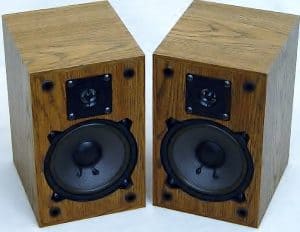
The list below should help you to identify the issue and troubleshoot the problem:
- Low Bitrate Audio Encoding
- Low Pass Filter In Your DAW
- EQ In Your DAW
- Low Pass-filter On Your Amplifier Or Receiver
- Your Amplifier Or AV Receiver Has No Crossover
- Your Settings On Your Amplifier Or AV Receiver Are Incorrect
- You Have Connected Your Speakers To Your Amplifier Or AV Receiver Incorrectly
See below for more detail on each of these scenarios.
In addition to that, there are some cases where there is just no way to fix your speaker that sounds like it is underwater. In that case, you will have to try to get it repaired or buy a new one.
Underwater Speakers – Scenarios That Are Applicable To Studio Recording
These scenarios will apply to producers and engineers in the studio. Because you are recording, editing, and creating audio tracks, there are instances where you may have done something that you should not have, and the result emanating from your monitors is not what you expected.
Low Bitrate Audio Encoding
This will happen once you have recorded, mixed, and mixed down your audio for listening purposes on various devices. This is a big part of a producer’s job because you have to make the track sound good on all devices that can play music, such as:
- Hi-Fis
- smartphones
- tablets
- car stereo systems
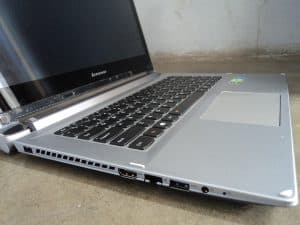
A good producer’s trait is having a track that they have made, and it sounds good on anything. Sadly, most producers don’t take into consideration bitrates when exporting their audio.
DAWs offer many options when exporting audio and bitrate (bit depth is one of them). I personally use Ableton when I record, edit, mix, and master my tracks, and even when I export them.
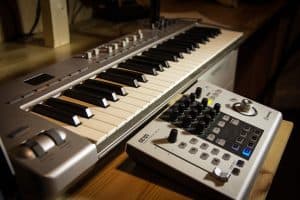
You have to check that the bit rate when you are exporting your audio is at least set to a suitable level. 320kbps is fine for general listening but remember that CD audio quality is 1411kbps. The higher the bit depth (rate), the more information the audio will contain, and the lower the bitrate, the less information it will contain.
If you have used a lower bit rate, your speakers may sound like they are underwater because the audio does not have the full range of frequencies that it is supposed to have, and sure enough, it will sound horrible.
Low Pass Filter In Your DAW
When they are new and figuring their way around sound applications like DAW’s and 3rd party plugins, many producers will inadvertently click on something they are not supposed to. This happens more often than not, and they don’t realize what they have done or how to fix it.
If your plugin or DAW has options on an element for a low-pass filter, make sure that it is turned off.
EQ In Your DAW
Similar to a low pass filter however this is the manual version of it.
You need to check your EQ settings if you only have that loaded up onto the track or section of the audio you are working on and ensure that you have the EQ settings set correctly.

Technically a low-pass filter is an EQ set to have no high frequencies, and you can just do this with the click of a button on some DAWs and 3rd party plugins.
On an EQ, it will look like a graph that you manually set. Hence make sure you have not selected a pre-saved setting or adjusted the EQ in such a way, making it act like a low pass filter.
Underwater Speakers – Scenarios That Are Applicable To Amplifiers & AV Receivers
If you are not a producer, don’t work with recording equipment, and have a normal home entertainment system, this section is for you. Some of the same principles apply here as it did with the previous scenario; however, the application is different.
Low Pass-filter On Your Amplifier Or Receiver
Some amplifiers and AV receivers will also have an EQ section, knobs, or settings that you can fiddle with, whether it is digital or analog. This principle is the same as the EQ for DAWs.
If you have set the EQ on your power stereo amplifier or AV receiver so that it acts as a low-pass filter, your speakers will sound like they are underwater.
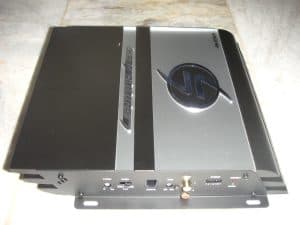
Check your EQ settings on your stereo amplifier or AV receiver, and make sure to set all settings to default and check your speakers then.
Your Amplifier Or AV Receiver Has No Crossover
Modern amplifiers and AV receivers come with a crossover, enabling them to work correctly with a subwoofer. In stereo systems that have the ability to reproduce surround sound, the amplifier or AV receiver will definitely have a built-in crossover.
A crossover enables the pass-through of certain frequencies and attenuating the ones you don’t want. It acts like a low pass filter pushing low frequencies to the subwoofer giving you that deep heavy bass in the same respect.
If you are trying to connect a subwoofer to your AV receiver or amplifier and it does not have a crossover built into it, the resultant sound coming from your subwoofer will sound horrible.
Fixing this is pretty easy by purchasing a passive crossover adapter available from amazon.
Your Settings On Your Amplifier Or AV Receiver Are Incorrect
Modern amplifiers and AV receivers have tons of settings on them, including presets. Make sure you have all your settings on your amplifier set to default and check your speakers then.
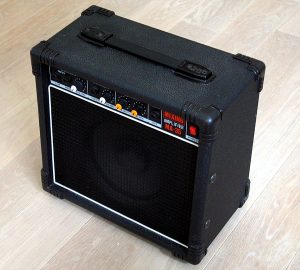
You Have Connected Your Speakers To Your Amplifier Or AV Receiver Incorrectly
Again modern amplifiers and AV receivers have dedicated channels for certain speakers, especially if they are equipped for surround sound.
These will have a dedicated channel for the subwoofer, and as such, that channel will have a crossover on it, which will only send low frequencies through to the subwoofer allowing it to function correctly.
For some reason, if you connect regular speakers to this dedicated subwoofer channel, the result will be that your speakers will sound like they are underwater.
Blown Speakers Will Sound Like They Are Underwater
A scenario that will override the previous two scenarios is one where your speakers are blown.
If your speakers sound like they are still underwater and you have, through the process of elimination, checked all the situations why they would possibly be doing this, then the only reason that is left is that they could possibly be blown.

There are many reasons why your speaker could be blown, which include having the wrong amplifier and speaker combination, driving your speakers too hard for too long, and many more.
Can You Fix This Type Of Damage To A Speaker
Sadly if you have damaged the voice coil, which is the main component that makes up the speaker, you will have to replace it. A voice coil that is damaged from too much RMS power is irreversible, and you will have to purchase a new one or try to have it repaired.
Conclusion
As we now know, there are several factors that you have to consider when your speaker sounds like it is underwater.
Depending on if you are in the recording studio or have a home theater system, these scenarios will differ slightly, but they are fixable. They range from incorrect settings to incorrect wiring of your speaker – and if you follow our article, you will be able to pinpoint which of these is causing the fault.
The one scenario that may not be fixable is if your speaker is blown. Then you would need to seek a professional’s help, either getting it repaired or having to purchase a new component.
You can learn about bookshelf speakers vs. soundbars here.
You can learn about 2-way vs 3-way speakers here.
Source list
Receiver making speakers sound like they’re underwater?
Audio sounds like it is underwater
Speakers sound like they’re underwater except center channel

